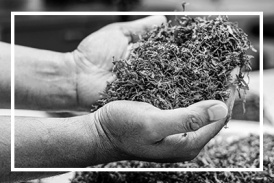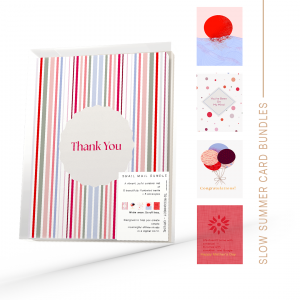Glimmery Moments Launches ‘Slow Summer’ Paper Collection to Support Accessible Behavior Change Toward Offline Living

Quote reading “Slow Summer invites you to return to the rhythm of the season — on paper” beside a serene dockside flatlay of Glimmery Moments’ stationery.
Dutch brand Glimmery Moments launches seasonal paper rituals to help people reconnect, reduce screen time, and restore focus — offline.
That’s where Glimmery Moments comes in. The Dutch paper goods brand has launched Slow Summer— a seasonal ritual series that turns everyday offline moments into emotional anchors. Whether it’s journaling in the shade or sending someone a handwritten card, these small acts help people replace digital fatigue with slower, more rewarding rituals — gently and sustainably.
Turning Good Intentions Into Lasting Rituals
While most brands focus on the ‘why’ of unplugging, Glimmery Moments focuses on the ‘how.’
Their Snail Mail Bundles, Writer Sets, and Correspondence Boxes are designed to help people act on their offline intentions — and make those habits stick.
Rooted in behavioral science and emotional design, the products support well-being through rhythm, reflection, and sensory connection — making behavior change simple, beautiful, and accessible for everyone.
“We’re not just telling people to unplug,” says founder Sushila. “We’re offering tools that replace fast, high-stimulation habits with slower rituals that feel just as good. That’s how behavior change becomes something you want to keep — not something you struggle to maintain.”
Why “Slow Dopamine” Matters
“Slow dopamine” isn’t a medical term — it’s a cultural metaphor for the shift away from instant gratification toward slower, deeper pleasure. It’s about choosing connection over consumption, and rewiring your habits around joy that builds, not burns out.
Sending a handwritten card — what Glimmery Moments calls a “red carpet moment” — creates a connection that outlasts any digital like. These rituals don’t just help the sender feel good. They spark emotional reward for the receiver, too — and often create a ripple effect of kindness and reconnection.
This is slow dopamine in action: a loop of meaning that supports mental well-being, encourages presence, and helps people persevere in their intention to live offline — with others.
Gifting as Emotional Support
The Slow Summer campaign reframes gifting as an act of emotional care — not just for birthdays or holidays, but for anyone who’s feeling overwhelmed, overstimulated, or simply lost in the scroll.
Snail Mail Bundles and Writer Sets are designed to be given as much as they are to be used — simple, thoughtful invitations to slow down, reflect, and reconnect.
“When you send someone a card or a ritual set,” says Sushila, “you’re not just reaching out — you’re helping them reset. That’s powerful. That’s connection.”
Why Summer Is the Moment
According to behavioral science, seasonal transitions are prime windows for habit change.
In summer, routines loosen, schedules open up, and people are naturally more receptive to new rituals. Glimmery Moments meets that moment with tools that make it easy to step into a more intentional rhythm — without rules, guilt, or restriction.
At a Glance — What Is Slow Summer?
• A seasonal offline ritual series by Glimmery Moments
• Includes Snail Mail Bundles, Writer Sets, and Correspondence Boxes
• Designed to reduce screen time and support slow, sustainable behavior change
• Aligned with habit science, seasonal living, and emotional connection
• Available now at glimmerymoments.com and select retailers
About Glimmery Moments
Glimmery Moments is a Dutch paper goods brand making behavior change simple, beautiful, and accessible. By offering seasonal tools rooted in emotional presence and mindful design, the brand helps people reconnect — with themselves and others — through small, meaningful rituals that support a more intentional life offline.
Anita Visser
Glimmery Moments
+31 10 795 1647
concierge@glimmerymoments.com
Legal Disclaimer:
EIN Presswire provides this news content "as is" without warranty of any kind. We do not accept any responsibility or liability for the accuracy, content, images, videos, licenses, completeness, legality, or reliability of the information contained in this article. If you have any complaints or copyright issues related to this article, kindly contact the author above.
Southern Rock Icons LYNYRD SKYNYRD Celebrate 50 Years with ‘Live at The Ryman'
New Schubert b2b Infographic Shares Tips For Navigating B2B Digital Marketing Challenges
Unique Place to Stay in Texas Creates Family Friendly Exotic Animal Petting Zoo Experience in Fredericksburg Texas
Więcej ważnych informacji
 Jedynka Newserii
Jedynka Newserii

 Jedynka Newserii
Jedynka Newserii

Handel

Komisja Europejska chce wprowadzić ujednolicone przepisy dotyczące wyrobów tytoniowych. Europosłowie mówią o kolejnej nadregulacji
Ministerstwo Zdrowia opracowało nowy projekt przepisów wprowadzających kolejne zakazy dotyczące wyrobów tytoniowych – całkowitą eliminację e-papierosów oraz zakaz aromatów w woreczkach nikotynowych. Najprawdopodobniej w ciągu kolejnych dwóch–trzech lat Polska będzie musiała implementować nową dyrektywę dotyczącą wszystkich produktów tytoniowych, nad którym niebawem ma rozpocząć prace Komisja Europejska. Europosłowie mówią o ryzyku chaosu legislacyjnego, nadregulacji i wskazują na zagrożenia związane z proponowaną podwyżką akcyzy.
Konsument
Za trzy miesiące ruszy w Polsce system kaucyjny. Wątpliwości budzą kwestie rozliczeń i podatków

Zaledwie trzy miesiące zostały do startu systemu kaucyjnego w Polsce. Kaucje obejmą szklane i plastikowe butelki oraz puszki z napojami. To duża zmiana dla producentów napojów, sklepów i konsumentów oraz pośredniczących w zbiórce operatorów systemów kaucyjnego. Na razie przepisy są na tyle niedoprecyzowane, że budzą wiele wątpliwości w kwestii rozliczania podatków czy rozliczeń z operatorami. Producenci będą musieli płacić podatek od niezwróconych butelek, co zwiększy ich koszty.
Transport
Rośnie skala agresji na polskich drogach. Problemem jest nie tylko nadmierna prędkość, ale też jazda na zderzaku

Za kilka dni zaczynają się wakacje, czyli statystycznie najniebezpieczniejszy czas na drogach. Wśród głównych przyczyn takich zdarzeń na prostych odcinkach drogi są nadmierna prędkość i jazda na zderzaku. Zarządca autostrady A4 Katowice–Kraków w ramach kampanii „Nie zderzakuj. Posłuchaj. Jedź bezpiecznie” zwraca uwagę na zjawisko agresji na polskich drogach i przypomina, że bezpieczeństwo zaczyna się od osobistych decyzji kierowcy.
Partner serwisu
Szkolenia

Akademia Newserii
Akademia Newserii to projekt, w ramach którego najlepsi polscy dziennikarze biznesowi, giełdowi oraz lifestylowi, a także szkoleniowcy z wieloletnim doświadczeniem dzielą się swoją wiedzą nt. pracy z mediami.











.gif)

 |
| |
| |
|